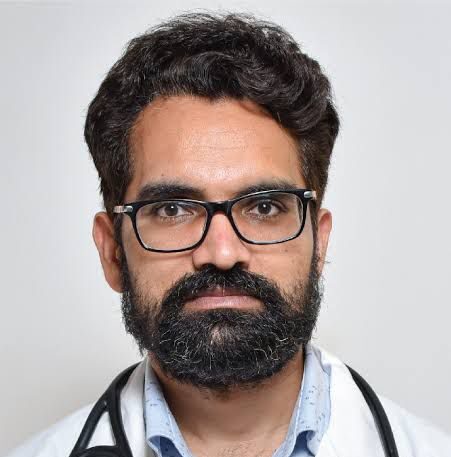
Dermatology
Dermatology is a specialized branch of medicine focused on diagnosing, treating, and preventing conditions related to the skin, hair, nails, and mucous membranes. Dermatologists are medical professionals trained in managing a wide range of skin disorders, from common issues like acne and eczema to more complex conditions such as skin cancer and autoimmune diseases.
This field combines clinical expertise with aesthetic knowledge to provide comprehensive care and improve patients’ overall skin health and appearance.
Scope of Dermatology:
Dermatologists diagnose and treat various skin conditions, including but not limited to:
- Acne: Dermatologists manage acne vulgaris and other forms of acne, offering treatments such as topical medications, oral medications, chemical peels, and laser therapy to control breakouts and prevent scarring.
- Eczema and Dermatitis: They address inflammatory skin conditions like atopic dermatitis, contact dermatitis, and seborrheic dermatitis, providing relief through moisturizers, corticosteroids, antihistamines, and lifestyle modifications.
- Psoriasis: Dermatologists treat psoriasis with topical therapies, systemic medications, phototherapy (light therapy), and biologic agents to reduce inflammation, alleviate symptoms, and prevent flare-ups.
- Skin Cancer: They perform skin cancer screenings, biopsies, and surgical excisions for basal cell carcinoma, squamous cell carcinoma, melanoma, and other types of skin malignancies, emphasizing early detection and prompt intervention.
- Hair and Scalp Disorders: Dermatologists manage conditions like alopecia (hair loss), dandruff, seborrheic dermatitis, and fungal infections of the scalp using medications, injections, hair transplantation, and scalp treatments.
- Cosmetic Dermatology: They offer cosmetic procedures such as Botox injections, dermal fillers, chemical peels, laser resurfacing, microneedling, and sclerotherapy to address wrinkles, scars, hyperpigmentation, vascular lesions, and other aesthetic concerns.
- Nail Disorders: Dermatologists diagnose and treat nail disorders like fungal infections, ingrown nails, psoriatic nails, and nail trauma, providing medical and surgical interventions to restore nail health.
- Allergic Skin Reactions: They manage allergic reactions, hives, angioedema, and drug eruptions through allergy testing, antihistamines, corticosteroids, and immunomodulators to alleviate itching, swelling, and discomfort.
Diagnostic Techniques in Dermatology:
Dermatologists utilize various diagnostic tools and procedures to evaluate skin conditions and formulate treatment plans, including:
- Skin Examination: Visual inspection and palpation of the skin, hair, nails, and mucous membranes to identify abnormalities, lesions, rashes, and growths.
- Skin Biopsy: Surgical removal of a skin sample for histopathological examination under a microscope to diagnose skin cancers, inflammatory conditions, and infectious diseases.
- Dermoscopy: Use of a dermatoscope to magnify and examine skin lesions, moles, and pigmented spots to differentiate between benign and malignant growths.
- Patch Testing: Application of allergens to the skin to identify contact allergens causing allergic contact dermatitis and other hypersensitivity reactions.
- Skin Culture: Collection of skin samples for microbial culture and sensitivity testing to diagnose bacterial, fungal, and viral skin infections and guide antibiotic therapy.
- Wood’s Lamp Examination: Use of a Wood’s lamp (ultraviolet light) to detect fungal infections, pigmentary disorders, and certain bacterial infections by assessing fluorescence patterns on the skin.
Treatment Modalities in Dermatology:
Dermatologists employ various treatment modalities based on the diagnosis and severity of skin conditions, including:
- Topical Medications: Prescription and over-the-counter creams, ointments, lotions, and gels containing corticosteroids, retinoids, antibiotics, antifungals, and immunomodulators for localized skin disorders.
- Systemic Medications: Oral medications such as antibiotics, antifungals, antihistamines, immunosuppressants, and biologic agents for treating systemic skin conditions and immune-mediated disorders.
- Phototherapy: Exposure to ultraviolet (UV) light through phototherapy, PUVA therapy (psoralen plus UVA), narrowband UVB therapy, and excimer laser therapy to treat psoriasis, eczema, vitiligo, and other phototherapy-responsive conditions.
- Surgical Procedures: Dermatologists perform surgical procedures like excisions, Mohs surgery, cryotherapy, electrosurgery, laser surgery, and chemical peels for skin cancer treatment, scar revision, mole removal, and cosmetic enhancements.
- Injectable Treatments: Intradermal injections of botulinum toxin (Botox), dermal fillers, corticosteroids, immunomodulators, and sclerosing agents for wrinkle reduction, volume restoration, scar improvement, and vascular lesion treatment.
- Laser and Light Therapies: Utilization of lasers, intense pulsed light (IPL), fractional lasers, and photodynamic therapy (PDT) for skin rejuvenation, hair removal, tattoo removal, vascular lesion treatment, and pigmentation correction.
Patient Care and Follow-Up:
Dermatologists provide comprehensive care to patients with skin conditions, including:
- Education and Counseling: Educating patients about their skin condition, treatment options, preventive measures, and skincare routines.
- Follow-Up Visits: Conducting follow-up appointments to monitor treatment progress, assess treatment efficacy, and make necessary adjustments to the treatment plan.
- Skin Cancer Screening: Performing regular skin cancer screenings, mole checks, and full-body skin exams for early detection of skin cancers and precancerous lesions.
- Cosmetic Consultations: Offering cosmetic consultations to discuss aesthetic concerns, develop customized treatment plans, and achieve desired cosmetic outcomes.
- Preventive Care: Advising patients on sun protection, skincare practices, lifestyle modifications, and risk reduction strategies to prevent skin damage, premature aging, and skin cancer.
- Collaboration: Collaborating with other healthcare providers, including primary care physicians, oncologists, allergists, and surgeons, for multidisciplinary care and coordinated management of complex skin conditions.
Conclusion:
Dermatology encompasses a broad spectrum of skin-related disorders and treatments, emphasizing the importance of specialized care to address various dermatologic concerns effectively. MET Hospital is your go-to place for excellent dermatological care. Our expert team is committed to providing exceptional care for dermatology-related conditions. You can count on us for specialized, modern medical care. At MET Hospital, your health comes first.
Departments
EXCELLENTBased on 126 reviews
 Saurabh Pandit2024-10-16My wife was admitted in case of emergency because of datura poisoning. When she was admitted, she was suffering from a high fever, dizziness, and itching all over her body. But thanks to the MET hospital and team, now she is fine and conscious. The staff of the hospital is professional; they treated me so well. Special thanks to Mr. Deepak; he also understands our financial condition and regards us with a special discount. Thanks, Met Hospital and team. Thanks a lot for your help.
Saurabh Pandit2024-10-16My wife was admitted in case of emergency because of datura poisoning. When she was admitted, she was suffering from a high fever, dizziness, and itching all over her body. But thanks to the MET hospital and team, now she is fine and conscious. The staff of the hospital is professional; they treated me so well. Special thanks to Mr. Deepak; he also understands our financial condition and regards us with a special discount. Thanks, Met Hospital and team. Thanks a lot for your help. Chandan Chauhan2024-10-10Best hospital best dr. And diagnosis and treatment all nursing staff behavior is best Best food Mr. Anup nursing staff very best staff All staff very best
Chandan Chauhan2024-10-10Best hospital best dr. And diagnosis and treatment all nursing staff behavior is best Best food Mr. Anup nursing staff very best staff All staff very best AKASH KUMAR2024-10-02I have recently visited at MET hospital because of high fever 🤒 and body pain. Know I am fit and fine because of Very helpful and supportive nursing staff and doctor. You can get your health care at reasonable price here. I would highly recommend MET hospital 🏥
AKASH KUMAR2024-10-02I have recently visited at MET hospital because of high fever 🤒 and body pain. Know I am fit and fine because of Very helpful and supportive nursing staff and doctor. You can get your health care at reasonable price here. I would highly recommend MET hospital 🏥 Harsh Kumar2024-10-02The staff at MET hospital has been extremely professional and cooperative. Every time have visited the hospital have been given good service . One staff Mr Anup stands apart as he is well versed with his job and does his work professionally. His behaviour towards patients is extremely courteous and he always treats them with lots of respect and smile. Mr Anup always tries to bring a smile on the patients face even when things are difficult. He is really a great asset to the MET hospital.
Harsh Kumar2024-10-02The staff at MET hospital has been extremely professional and cooperative. Every time have visited the hospital have been given good service . One staff Mr Anup stands apart as he is well versed with his job and does his work professionally. His behaviour towards patients is extremely courteous and he always treats them with lots of respect and smile. Mr Anup always tries to bring a smile on the patients face even when things are difficult. He is really a great asset to the MET hospital.

















